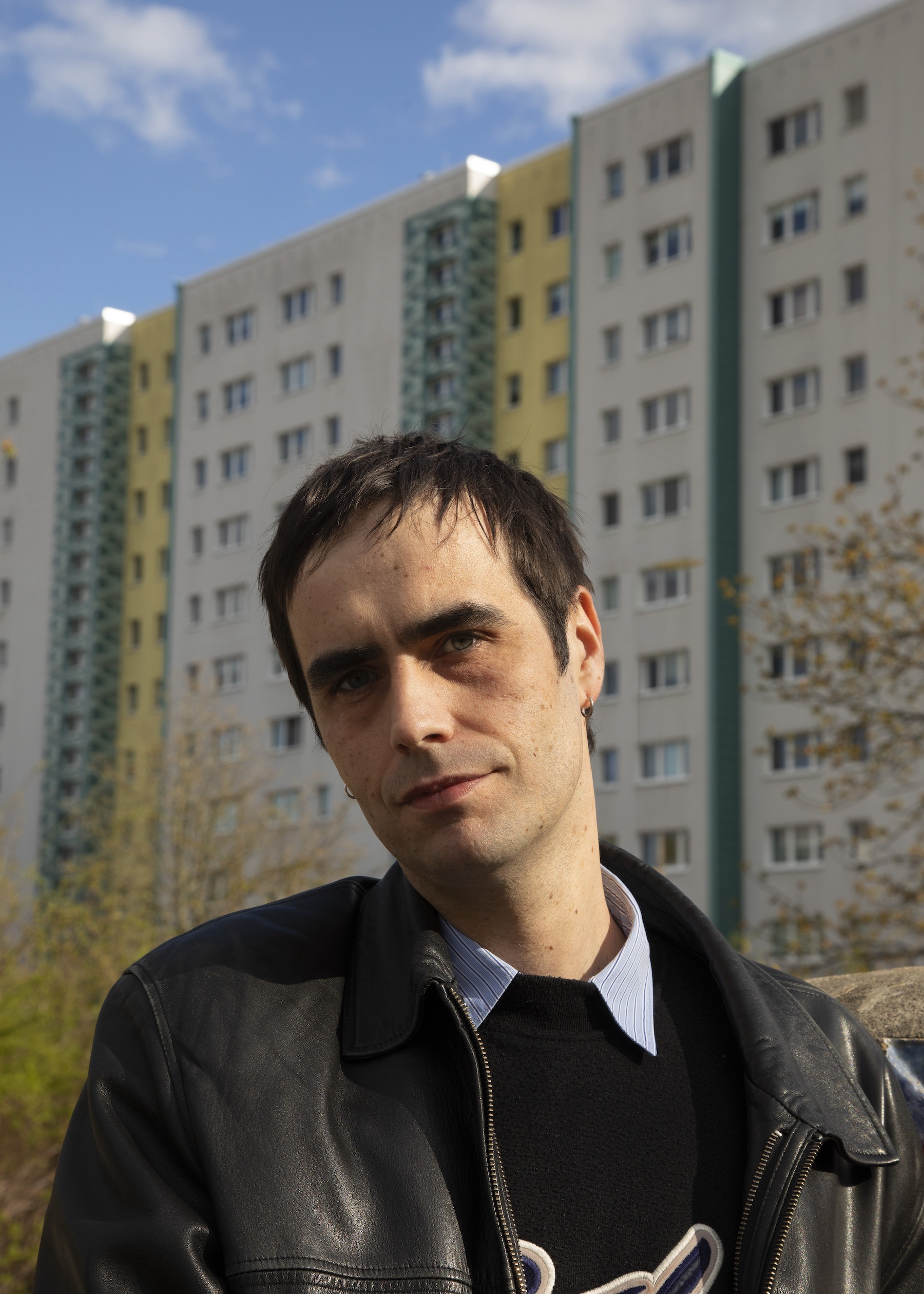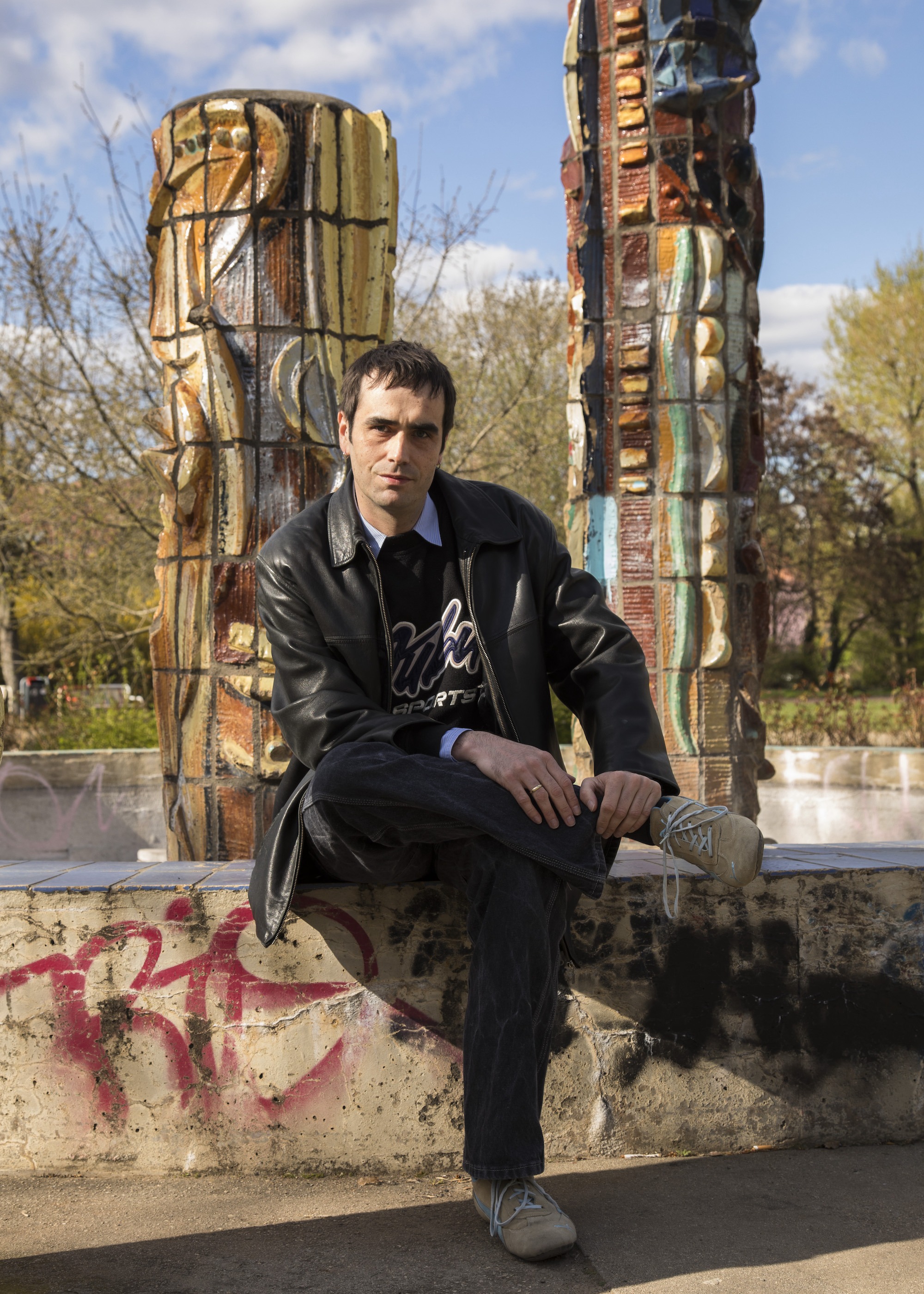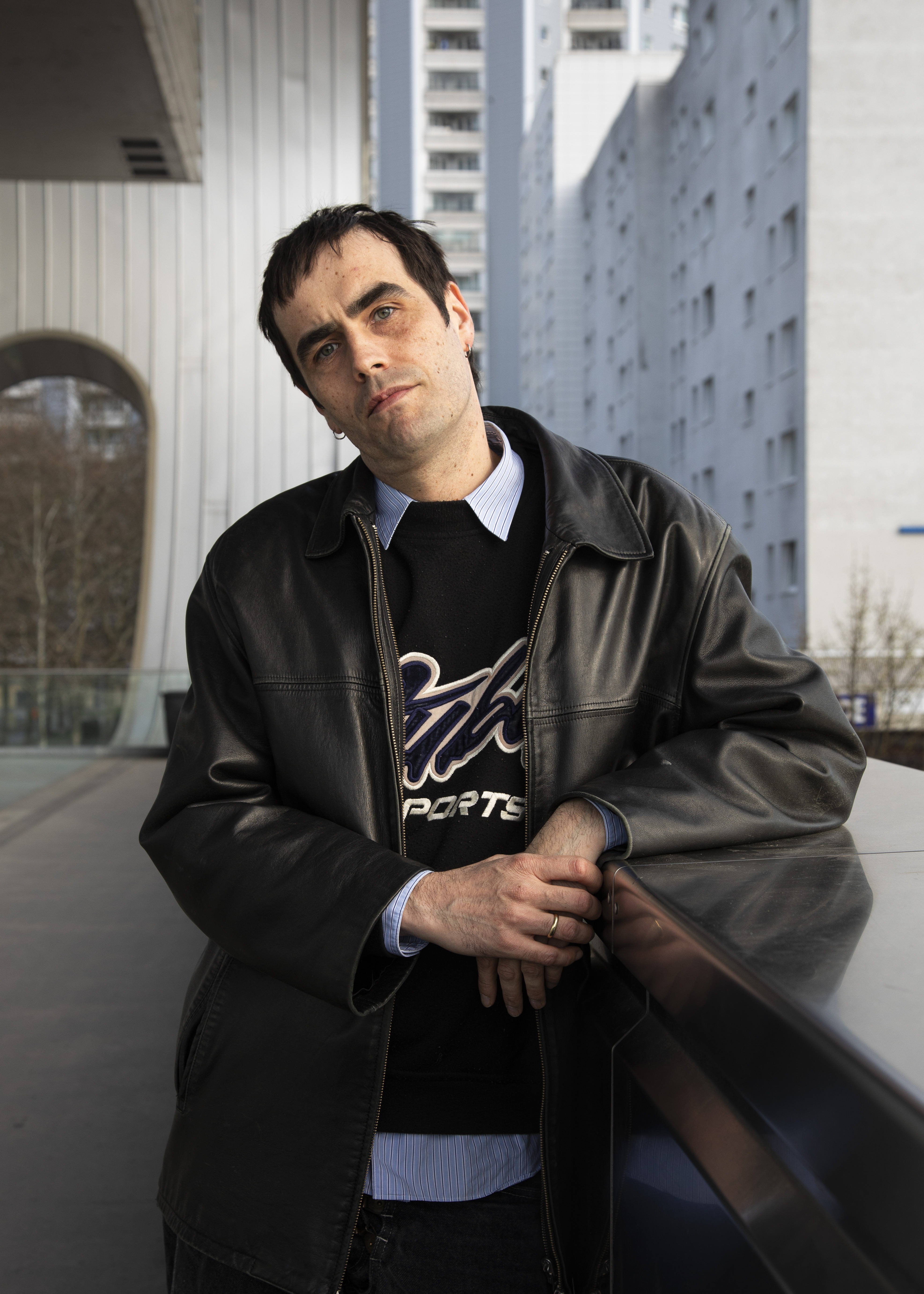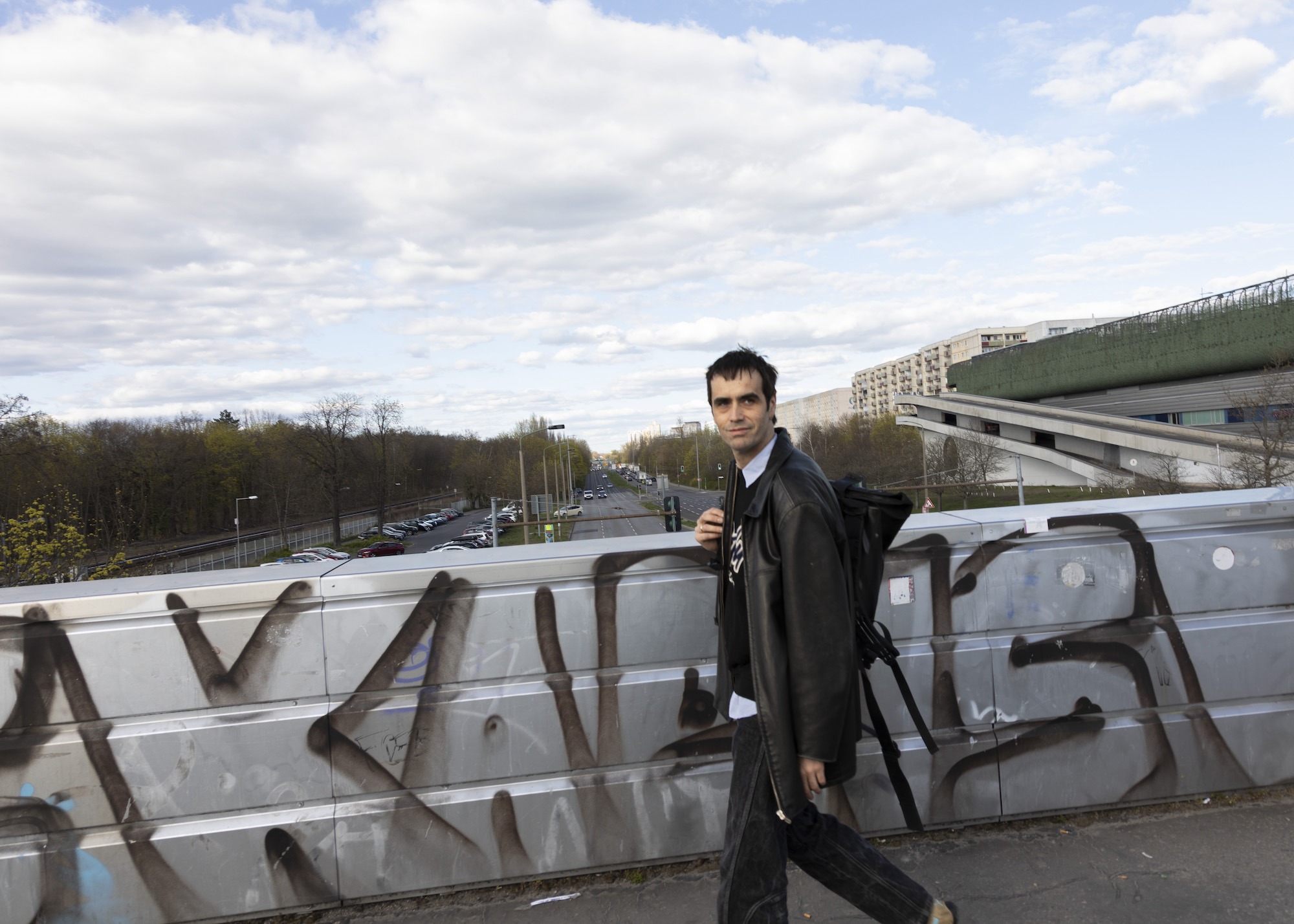“The past not gone, refusing to leave” – An interview with GAJEK

Hey Gajek, your latest album Cutting Together Apart was released in March 2025 via the Belgian label stroom.tv. What has happened since and how is it being received by audiences?
It’s been received very well! I played some shows, mostly in Germany, which were all good and intense. We even had a slo-mo moshpit in Cologne! I was happy to see that the music speaks to people. After the gigs I often found myself in conversation with folks from the audience who would come up and talk to me about the album or the show, sharing their impressions. That was very cool.
Congratulations on this hauntingly beautiful and moving record. Can you share some of your work and thought processes that went into the creation of Cutting Together Apart?
Thank you so much! It makes me very happy that it resonates! The record deals with memory, with emotions, with grief, with joy. Tenderness and roughness. Youth Culture, my growing up in the 90s and 2000s in East Germany. A lot of things I was processing – which the album helped me with. The weird shimmering effects and contradicting resonances of feelings. Ecstasy and desperation, hopelessness and optimism. It’s all tied up and entangled, and it can be difficult, even decades later, to make sense of it. For me, the album is an exercise in becoming aware and letting go.
“Being present has to do with failing.”
Boomkat describes it as: “not an album to be experienced in pieces, you’ve got to live with it for the duration to unravel its subtleties.” I think this description is spot on. Was that something you had in mind while producing it? Perhaps also in relation to current streaming and playlist cultures?
Perhaps it comes from the writing process which was very intimate. I lived with it! Making music plays a huge role in my life. It’s a daily practice: sometimes it’s me hiding, sometimes it’s me shining. In general, I try to create an environment with an album that feels lived in. I think it’s good to trust that if you feel it, others will most likely feel it too. When I worked on the music, I had no idea whether it would be released or not. So, I wasn’t really thinking about streaming or playlists. But I probably do work in the album format in relationship to musical time. I like to let things unfold. Editing piece by piece. It just feels good when it comes together, on a primal level!
How would you describe the progression of your sound leading up to this project?
It took time to get there. My albums have been formed by the events in my life and vice versa. I didn’t have much of a plan when I started out. Always too many ideas, always bored quickly. I was curious and very driven, obsessed with the process and with making music. I could get completely lost in there, just producing and producing for hours, days, weeks and years, forgetting the outside world. I was playful and deeply serious like young people often are. And inexperienced. My start was in club music, and I had always felt connected to experimental music – abstraction was a familiar language. What came less easy to me was finding emotional depth; to open up. There are many tricks for white male artists to be kind of absent from our work, absent as people – to use everything as a resource and let out certain parts of the story, to create an image of control. I always wanted to be honest in my music but it took time and work actually be present, because being present has to do with failing. Trying to write lyrics in English, trying to make an earnest pop song, working with my own voice – all that was, at times, very awkward, but it was just as important as all these hours I spent obsessing over details. With Cutting Together Apart these experiences came together in a way that felt very true to me, organic.

“Digging can be archeology, or forensics”
The usage of playful vocal mantras, chops and pitched voice fragments is very present on Cutting Together Apart. Can you reveal the sources of these elements? Are they based on sample work, self-recorded vocals or a secret third thing?
It is my voice. In a way it’s sampled on a content level. I used various literary sources as the basis for it – that would be the secret third thing! I’ve been working with vocals for some time now and have also tried out other formats, longer poetry such as spoken word or more classical song structures. I like the chopped mantra-style, it blends in well with the sounds in a way I find mutually enriching. Sometimes the information density of electronic music can be detrimental to voice-work and the other way around. So this is a good balance for me.
“Buried the past, don’t know how to dig it all up again”… phrases like this and the way they are processed and sonically placed within the tracks, to me, carry an eeriness. Mark Fisher’s understanding is that “[t]he eerie […] is constituted by a failure of absence or by a failure of presence”, which relates to the framework of your work that negotiates fractured East German temporalities and discontinuities. Fisher continues: “Since the eerie turns crucially on the problem of agency, it is about the forces that govern our lives and the world.” Would you consider your artistic practice as an act of claiming agency within narratives about East German dis/continuities?
I think so. My generation grew up in a gap. There was a lot of absence for sure. Things to come that had not arrived yet – and would in some cases never arrive – the past not gone, refusing to leave. There was a lot of silence around this time and still is. Alle reden übers Wetter. It takes work to break through it. World history playing out in the daily lives of people, geopolitical conflicts and siblings not talking to each other for reasons that people pretend to have forgotten. Secrets, grudges, tables turning on winners and losers. Photos that contradict stories that have been told, uniforms and documents in basements and attics. It can seem like detective work, but it feels more like a ghost story. Digging can be archeology, or forensics, and it can also be a way to release something that otherwise will not stop coming back. Claiming the gap is part of that process for me.

Who buried the past and who has the tools to dig it all up again?
I think people are in the process of digging right now! Tools for digging can be writing books, or making movies. I’m digging with the album – my tool is music. There’s been some improvement regarding the visibility of diverse East German experiences. Impressive art has always been made but more recently it finally got the chance to find its way into the spotlight. Many good books came out (novels as well as other formats) from authors like Olivia Wenzel, Anne Rabe, Manuel Sékou and more. But it’s not just about digging stuff up. You need to incorporate it, integrate it, feel it to understand where things are going. As for who buried the past, my guess is that we all did it, in many different ways for many different reasons. Some things need to be buried. Hauntings come when things stay unacknowledged. These are the skeletons that rise from the grave.
In West German discourse it seems that the immediate post-reunification period in East Germany is often understood in terms of a state power vacuum and the “Baseball Bat Years” [Baseballschlägerjahre]. Yet, in the autobiographical paragraph accompanying your latest album, a counter-narrative of youthful freedom in Gabber kicks and urban friendships shines through. How did you experience this period and its legacy?
This subject is very complex and there are so many different experiences. However, there are some through-lines. I noticed that I am still on the run. Still out of joint! The lack of prospects I experienced when I was young and the constant need for improvement has led to considerable restlessness. In many ways I grew up very freely. I was always out and about. There wasn’t much oversight from parents or institutions. Many things we had to figure out for ourselves as young people, and some things we probably didn’t really figure out! In this absence there was also plenty of room for other things. Youth culture was taken very seriously. I think this was in part because our parents often had no opportunity to develop professionally in the GDR. You had to look for fulfillment and belonging somewhere else, find an identity and community around something like music. There was also an aspect of rebellion to it of course. I think this resonates still today. I remember it to be very rigid in the early aughts. It wasn’t as aesthetically flexible as it is today, youth culture was a commitment. Skaters were skaters and only skaters, punks were punks and only punks. I found that very limiting and it took me a while to listen to both Mobb Deep and Autechre without feeling guilty. Longer still to understand the gender dynamics of these spaces and the other forms of exclusion happening. But generally, it was a very positive thing for me. Youth culture and art helped me to find a way in life. So I’m glad that my family and the people around me took records and concerts and drawing and style so seriously, because it allowed me to see myself in a different position than the one the class system had in mind for me. To dream and pursue these dreams. But yes, violence was a big part of everyday life. I didn’t think about it much. It was just normal that there were many rules you had to follow to get to school safely. Nervous vigilance, reaction time, no-go areas. It’s really painful to see this coming back today with the current rise of right-wing movements, when the streets feel unsafe again. Especially for minorities, which I am not.

“It is still difficult to find information about art or subculture that was created in the GDR”
Can you tell us about your radio show Socialist Realness?
For the longest time I didn’t know much about the experimental music scene in the GDR. I kind of identified more with the West as that was what I knew and what everybody referenced. During the pandemic I read a book about Krautrock in which it was said that a comparable progressive music culture had never existed in the GDR. That made me curious. I tried to find experimental music made in the GDR. And I did. It is still somewhat difficult to find information about art or subculture, no matter what discipline, that was created in the GDR. Things have improved somewhat in the meantime. But there are still a lot of gaps, parts of the picture that are missing. People and groups whose experiences and achievements have been made invisible, non-white experiences, migrant experiences, queer experiences. The things I found evoked a strange feeling of familiarity; styles that seemed to belong to alternate music histories. For example, there were blues-punks in the GDR, which as far as I know was not a thing anywhere else. Combinations like that were very common, lo-fi hybrids. They often come from a lack of something, missing resources and support, but they can lead to unusual and independent strategies. The more I learned about this history, the more I felt kinship with it. At some point it made sense to start a mix series to share the music. That is Socialist Realness. At the moment, I’m taking a break to find a new perspective onto it, but it will be back! I realized that it has informed my own music too and that it has done so even before I knew it. I try to incorporate this even more clearly into my music and artwork. Like the picture of the punk hug on the album cover. People used to wear braids like that, the clothes are my mother’s and father’s. They have their own history.

Apart from your own releases you also compose and produce music for films, theatre, exhibitions and performances. Most recently you scored the film The Investigation by RP Kahl and the short film Fear does not Exist by Anna Zett. How does your approach to music making alter when working on commissions for other art forms rather than an album?
With commissioned work you are part of a bigger process, you have to find the right tone and perhaps step back. Attention works differently. With my own music, I always try to leave no flesh. I cut it down. Commissioned work is different. Sometimes flesh is needed. Music sometimes needs to be intense even though the focus is somewhere else. That is often the case with theater productions. With The Investigation, it was particularly important to find the right tone, because the subject is so sensitive. It was important to avoid emotional manipulation and still create a different layer that allows the viewer to let their focus adjust at times, as the film runs over 4 hours. Fear Does Not Exist is special as I didn’t compose a score, but I made a collage out of GDR avantgarde and underground music, about 40 tracks total on four channels. It was originally made for a performance by Anna, but then Anna used it for her film. I think the outcome is very impressive, I love the film. It gets me every time. It bleeds creativity and is so dense in information and yet has a clear emotional core. If you have the chance, go see it!
What’s coming up next for you?
Mostly playing gigs and finishing a new record!


Gajek

This article is brought to you by Struma+Iodine as part of the EM GUIDE project – an initiative dedicated to empowering independent music magazines and strengthen the underground music scene in Europe. Read more about the project at emgui.de
Funded by the European Union. Views and opinions expressed are however those of the author(s) only and do not necessarily reflect those of the European Union or the European Education and Culture Executive Agency (EACEA). Neither the European Union nor EACEA can be held responsible for them.